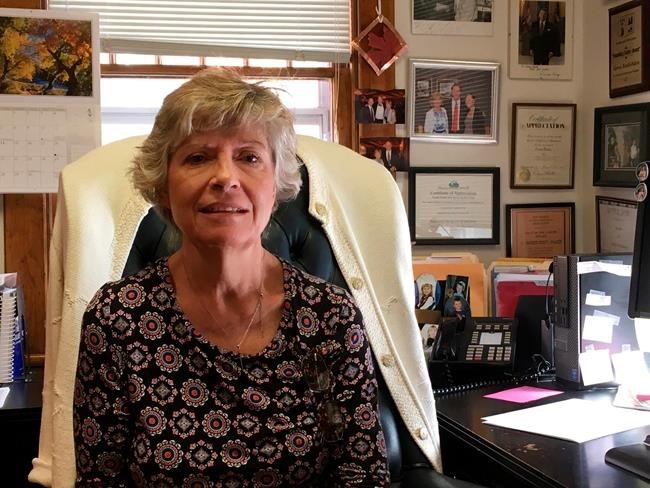
In this Monday, Nov. 20, 2017, photo, Wyoming attorney Karen Budd-Falen, a candidate to lead the U.S. Bureau of Land Management, sits in her law office in Cheyenne, Wyo. Budd-Falen says environmentalists mischaracterize her as a supporter of the wholesale transfer of federal lands to state and local governments and private interests when she has no opinion on the issue. (AP Photo/Mead Gruver)
Republished November 26, 2017 - 12:12 PM
Original Publication Date November 26, 2017 - 10:51 AM
CHEYENNE, Wyo. - A candidate to lead an agency that oversees public lands totalling one-eighth of the U.S. says environmentalists mischaracterize her as an advocate of signing those landscapes over to state and local governments and private interests when in fact she's got no opinion on the issue.
Cheyenne attorney Karen Budd-Falen and others drew dozens of protesters when she addressed a recent land-use forum in western Montana. The protesters spoke out against the small but growing movement in the West to wrest control of public lands from federal agencies.
A land-transfer advocate invited Budd-Falen to the Ravalli County event Nov. 18 but her legal work has nothing to do with the topic, Budd-Falen said.
"It's not an issue that I was dealing with. But people just assumed that," Budd-Falen told The Associated Press in an interview Monday.
Budd-Falen apparently is or has been among those under consideration to direct the U.S. Bureau of Land Management, the Interior Department agency that oversees some 386,000 square miles (1 million square kilometres) of mostly arid land concentrated in a dozen Western states.
Interior Secretary Ryan Zinke interviewed her for the job in March, she said.
Interior spokeswoman Heather Swift declined to say whether Budd-Falen was still a candidate or when somebody might be nominated for the director job, which has been vacant since January. Still, many environmentalists have been calling Budd-Falen too extreme.
Her legal advocacy has laid the groundwork for those who now want the federal government to relinquish public land, said Greg Zimmerman, deputy director of the Denver-based environmental group Center for Western Priorities.
"She may say she has no opinion on it but her career has been spent propping up that ideology," Zimmerman said Tuesday.
Budd-Falen and her husband, Frank Falen, have a firm with four other attorneys in a house in downtown Cheyenne. The practice focuses largely on ranchers and property rights — anything from easements to oil and gas leases and how to comply with government regulations.
"I do a lot of just simply regulation-explaining to private industries. There are tons of regulations out there. They are hard to comply with. And it's not that a lot of my clients don't want to comply. It's how do you fill out this massive amount of paperwork to put in a water tank?"
Not water tanks but Budd-Falen's work helping local officials write land-use plans have made her a lightning-rod candidate to lead the BLM. The plans spell out local priorities for the BLM, U.S. Forest Service and other government agencies to keep in mind in counties where federal land covers a lot of ground — perhaps half or more of the total land area.
A recently approved Crook County, Oregon, land-use plan that Budd-Falen consulted on, for example, calls for the federal government to recognize the economic importance of logging, ranching, farming and mining.
Environmentalists and sportsmen's groups worry the plans are a slippery slope toward federal land takeovers, especially as President Donald Trump's Interior Department looks to reduce the size of national monuments in Utah and perhaps elsewhere.
Local land-use plans can't legally assert such control, Budd-Falen said.
"It's not veto power. The local government can't mandate that you cut a tree here or you graze cows there. You can't do that. But the local government can say here's this overall national policy, this is how it's going to impact my people in my county," Budd-Falen said.
Budd-Falen declined to "even venture a guess" whether wholesale transfers of federal land would help local communities, adding it's also not her area of legal expertise.
Budd-Falen's clients in the 1990s included Cliven Bundy, a Nevada rancher on trial for a 2014 confrontation with federal officials over grazing fees. Budd-Falen grew up on a ranch in western Wyoming's Upper Green River Basin — an area known for world-class trout fishing and some of the nation's biggest gas fields — and said she went to law school at the University of Wyoming knowing she would represent ranchers.
Today, she said, too many government officials have a say in small-scale decisions affecting federal grazing allotments they've never seen in person.
Her father used to invite local BLM and Forest Service officials over when they were considering minor, local changes. They'd drink coffee, look at maps and argue but make decisions quickly, she recalled.
"I think that's a better way to manage than we're going to have a million rules from Washington that may or may not apply, and so we're going to give all these people who have all these political ideas a say," Budd-Falen said.
___
Follow Mead Gruver at https://twitter.com/meadgruver
News from © The Associated Press, 2017